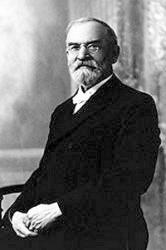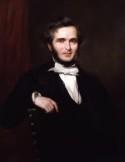Planning worship?
Check out our sister site, ZeteoSearch.org,
for 20+ additional resources related to your search.
- |
User Links
Person Results
‹ Return to hymnal


Export as CSV
William Fairfield Warren

1833 - 1929 Person Name: W. F. Warren Hymnal Number: d156 Author of "Homeward bound" in Happy Voices Warren, William Fairfield, D.D., was born at Williamsburg, Massachusetts, in 1833, and graduated at the Wesleyan University in 1853. After spending some time in Germany, he was appointed Professor of Systematic Theology in the Methodist Episcopal Mission Institute at Bremen, in 1861. Returning to America in 1866, he held some important appointments there, ultimately becoming President of Boston University, in 1873. His hymn, "I worship Thee, O Holy Ghost" (Whitsuntide), was contributed to the American Methodist Episcopal Hymnal, at the request of the editorial committee, in 1877, and was published therein in 1878. It has passed into other collections.
-- John Julian, Dictionary of Hymnology (1907)
==========================
Warren, William, D.D. (Williamsburg, Massachusetts, March 13, 1833--December 6, 1929). He prepared for college at East Greenwich Academy, graduated A.B., Wesleyan University, took training at Andover Theological Seminary, and continued his studies at the Universities of Berlin and Halle. He was the recipient of honorary degrees from Boston, Wesleyan, and Ohio Wesleyan Universities. Ordained a Methodist Episcopal minister in 1855, after preaching in Boston for five years he returned to Germany where for a like term of years he was Professor of Systematic Theology at Mission Institute, Bremen, which later became Martin Institute at Frankfort. He returned to Boston to occupy a similar professorship at the Theological Seminary and to become Acting President when the Methodist Biblical Institute moved there from Concord, New Hampshire. His return gave impetus to the plan under way which eventuated the establishment of Boston University in 1869. Becoming President of the University in 1873, he was Dean of its School of Theology, 1903-1911, and made President Emeritus in 1923.
--Robert G. McCutchan, DNAH Archives
William Fairfield Warren
Theo. C. Perkins
Hymnal Number: d14 Author of "Zion, Zion, holy [lovely] Zion" in Happy Voices
Theo. C. Perkins
J. W. Cunningham
1780 - 1861 Hymnal Number: d67 Author of "How cheering the thought, that the spirits in bliiss" in Happy Voices Cunningham, John William, M.A., was born in London, Jan. 3, 1780, and educated at St. John's College, Cambridge, where he graduated in honours, and subsequently became a Fellow of his College. In 1802 he was ordained to the Curacy of Ripley, in Surrey. The following year he removed to Ockham, and later to Clapham, where he was curate to the Rev. John Venn, who was the original of Berkeley in The Velvet Cushion. In 1811 he was presented by his family to the Vicarage of Harrow, which he held for fifty years. He died Sept. 30, 1861. He published, in addition to pamphlets on various subjects:—
(1) World without Souls, 1805; (2) The Velvet Cushion, 4th ed. 1814; (3) De Ranee, a Poem, 1815; (4) Morning Thoughts on the Gospel of St. Matthew, 1824; (5) Morning Thoughts on the Gospel of St. Mark, 1827. The two series of Morning Thoughts contained hymns which were given without any signature. As there is an acknowledgment that with the verse, in the first case he was assisted by "a friend," and in the second “by friends," it is impossible to distinguish his work from that of his "friends."
With his name and publications the following hymns are associated:—
1. As the sweet flower that scents the morn. Death of an Infant. This poem appeared in The Velvet Cushion (4th ed. 1814, p. 157), in 6 stanzas of 4 lines. ln1826 it was given in a revised form as a hymn in 3 stanzas of 4 lines in the American Episcopal Psalms & Hymns, No. 127. In the Unitarian Hymns for the Church of Christ (Hedge & Huntington), 1853, No. 762, it is increased to 4 stanzas. It has been attributed to Allan Cunningham, but in error.
2. Dear is the hallowed morn to me. Sunday Morn¬ing. This was given in Oliphant & Sons' Sacred Poetry, 4th ed., 1822, in 8 stanzas of 4 lines, and signed "Cuningham." In 1833 Bickersteth gave stanza i.—iii., vi., as No. 639 in his Christian Psalmody, beginning, "Dear is to me the Sabbath morn." This has been repeated in English and American collections.
3. From Calvary a cry was heard. Good Friday. Published in his Morning Thoughts on St. Matthew, 1824, p. 103, in 5 stanzas of 4 lines. It is in somewhat extensive use In America, and sometimes in 4 stanzas as in Dr. Hatfield's Church Hymn Book, 1872, No. 460.
4. How cheering the thought that the spirits in bliss. Ministering Angels. Published in his Morning Thoughts on St. Matthew, 1824, p. 15, in 2 stanzas of 4 lines. In Bateman's Sacred Melodies, the Scottish Presbyterian Hymnal for the Young, 1882, &c, and several American collections, it is given as "How [dear is] delightful the thought that the angels in bliss."
5. The God of Israel never sleeps. Watchfulness. Published in his Morning Thoughts on St. Mark, 1827, p. 103, in 3 stanzas of 6 lines. As No. 548 in Kennedy it is in an altered form. [William T. Brooke]
--John Julian, Dictionary of Hymnology (1907)
J. W. Cunningham
John M. Lowrie
Hymnal Number: d71 Author of "How precious is the story" in Happy Voices
John M. Lowrie
Hodges Reed
Hymnal Number: d84 Author of "O, happy they who reach that place" in Happy Voices
Hodges Reed
Jonathan Allen
Hymnal Number: d174 Author of "Sinner [sinners], will you [ye] scorn [slight] the message" in Happy Voices Allen, Jonathan. Concerning this hymn-writer, to whom is credited the hymn, "Sinners, will you scorn the message?" we can only say that this hymn appeared in Hymns adapted to Public Worship, collected from various Authors, Exeter, S. Woolmer, 1801, edited by Richard Pearsell Allen, Minister of Castle Street Meeting, Exeter; and that in D. Sedgwick's marked copy of John Dobell's New Selection, &c., 1806, it is attributed to Jonathan Allen. What authority Sedgwick had for this ascription we cannot determine. It is through him that it has gained currency. Allen's hymn, "Sinners, will you scorn, &c," is sometimes given with stanzas i. and ii. transposed, as "Hear the heralds of the Gospel," as in the American Baptist Praise Book, N. Y. 1871. [William T. Brooke]
-- John Julian, Dictionary of Hymnology (1907)
Jonathan Allen
John Curwen

1816 - 1880 Person Name: John Curwin Hymnal Number: d90 Author of "I'm a little pilgrim, And a stranger here" in Happy Voices Curwen, John, son of the Rev. S. Curwen, of an old Cumberland family, born at Heckmondwike, Yorkshire, Nov. 14, 1816, and educated at Coward College, and University College, London. In 1838 he became assistant minister in the Independent Church, Basingstoke; co-pastor at Stowmarket in 1841, and pastor at Plaistow, Essex, in 1844. There he developed and promoted the Tonic Sol-fa method of teaching to sing, using it in his own schools and church, and lecturing upon it in various parts of the country. Resigning his ministry through ill health, in 1867, he established a printing and publishing business in order the better to create a Tonic Sol-fa literature. In 1853 he assisted in founding the Tonic Sol-fa Association, for the promotion of that method of singing, and in 1862 the Tonic Sol-fa College. He died May 25, 1880. Besides a number of works explanatory of the Tonic Sol-fa system, Mr. Curwen was the compiler of Sacred Songs, 1840, and Hymns & Chants, 1844. In 1846 these were combined as The Child's Own Hymn Book. This was enlarged in 1865, and recast as The New Child’ s Own Hymn Book in 1874. As a Sunday-school hymn-book this collection has been exceedingly and deservedly popular.
For it Mr. Curwen composed two hymns:—
1. I'm a little Pilgrim. Pressing Heavenwards. This was written in place of another with the same first line, whose author had refused permission for its use in Mr. Curwen's book. The time and chorus usually sung with it are American.
2. 0 what has Jesus done for me? Passiontide. This was also written in place of another having the same line.
These are the only hymns known to be his The Sabbath Hymn Book, Lond. 1859, was also edited by Mr. Curwen. [Rev. W. R. Stevenson, M.A.]
--John Julian, Dictionary of Hymnology (1907)
John Curwen
John Charles Ryle
1816 - 1900 Person Name: John C. Ryle Hymnal Number: d39 Author of "I do believe, I now believe" in Happy Voices
John Charles Ryle


 My Starred Hymns
My Starred Hymns


